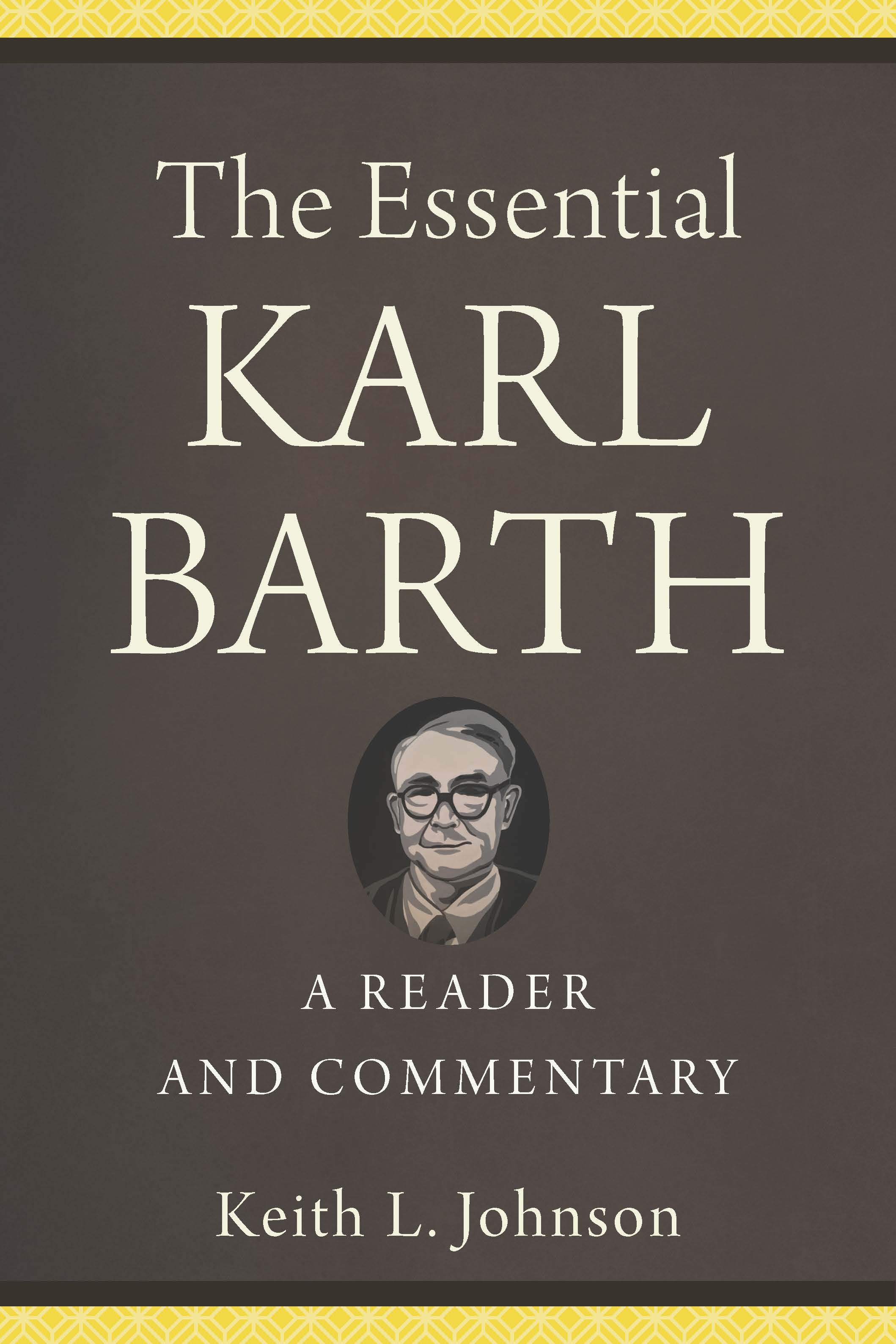
This volume features some of my favorite selections from the work of Karl Barth supplemented by introductory essays and footnoted commentary by me.
“This is the best one-volume anthology of Barth’s theology available in English. Barth’s writings are thoughtfully selected to cover his early development, his mature theology, and his political development. Keith Johnson’s critical commentary is superb. This book will be of great service not only in the classroom but also in the pastor’s study and in the hands of any interested reader. It deserves a wide readership wherever there is interest in Karl Barth.”
George Hunsinger, Princeton Theological Seminary
“This volume offers a delightful and illuminating approach to the theology of Karl Barth, one of the most significant theologians in the Protestant tradition. Johnson serves as a well-equipped and sure-footed guide as he draws the reader gently into key excerpts from Barth’s rather daunting and multifaceted corpus of work. Johnson is judicious in his selection of texts, insightful in his introductions, annotations, and explanations, and considered in his rendering of the life and legacy of Barth. The result is a highly impressive achievement, offering an accessible yet informative pathway into the writings of this visionary theologian.”
Paul T. Nimmo, King’s College, University of Aberdeen
“It’s a challenge to figure out which texts can best introduce the curious to the complex music of Karl Barth’s theology. In The Essential Karl Barth, Keith Johnson has curated and introduced a rich assortment of Barth’s writings spanning his career, and Johnson’s wise and learned commentary keeps ever in view the contexts in which Barth did his work. An invaluable resource for exploring Barth’s theology and his world.”
Angela Dienhart Hancock, Pittsburgh Theological Seminary
“This is an astonishingly helpful book. Johnson’s introductions are clear, elegant, and effortlessly learned, and his selection of texts gives readers not only an overview but an actual feel for Barth’s thought. The fact that he does all of this in a single volume is a marvel. For anyone who wants to get a grip on the theology of Karl Barth, this is the book to read!”
Kevin W. Hector, University of Chicago Divinity School
“Johnson has provided a wonderful collection of texts judiciously selected from the voluminous corpus of Barth’s works. Each reading is accompanied by excellent introductions and commentary. This volume will no doubt introduce many students to Karl Barth, and it is a marvelous resource for all who would seek to learn more about one of the most important theologians of the twentieth century.”
Kimlyn J. Bender, George W. Truett Theological Seminary, Baylor University
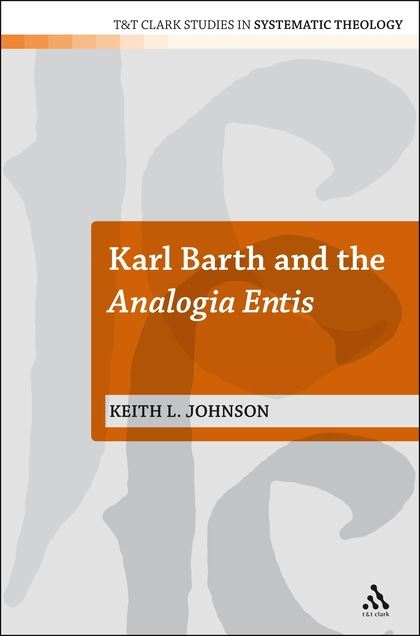
This book tells the story of Karl Barth’s engagement with the Roman Catholic doctrine of the analogia entis (analogy of being). In addition to providing an analysis of Barth’s thought about the doctrine from the beginning to the end of his career, the book provides close readings of the work of key Roman Catholic thinkers like Erich Przywara, Gottlieb Söhngen, and Hans Urs von Balthasar.
“Keith Johnson’s Karl Barth and the Analogia Entis is perhaps the best work on this demanding topic ever to have been written. It contributes not only to the field of Barth studies but also to modern theology in general. It approaches this vexing question with painstaking care, erudition and sophistication. In the process it makes a vital contribution to contemporary ecumenical discussion among Protestant and Roman Catholic theologies. I believe it will become a standard point of reference and that it will be widely read and cited.”
George Hunsinger, Princeton Theological Seminary
“Given that metaphysics seems to be making a comeback in American Protestant theology, Keith Johnson’s fine study of the debate between Karl Barth and Roman Catholic theologians with respect to the so-called “analogy of being” could not be more timely. The verdict of the last generation on this debate was that it rested on a misunderstanding on Barth’s side. Johnson gives us ample reason to question this verdict – and even more reason to take Barth’s criticisms seriously. This is ecumenical theology at its best – sober and penetrating but unfailingly courteous. This book will be much-discussed.”
Bruce L. McCormack, Princeton Theological Seminary
“Keith Johnson’s forcefully argued and elegantly written book is the best we have on the theological substance and historical development of Karl Barth’s treatment of the analogia entis. Following von Balthasar, most have assumed that Barth’s resistance to the analogia entis of Przywara and Söhngen was misplaced, that he never really understood their efforts, and that he eventually, and on the sly, allowed a version of the idea to form his mature account of divine and human relations. Johnson shows the mistake in each of these assumptions. Barth’s resistance never wavered. It followed directly from the Protestant commitments that he spent his career reviving and explicating, and he understood the analogia entis well enough to see its incompatibility with the Reformation’s understanding of justification (in Przywara’s case) and with its insistence upon the ever sinful nature of the nevertheless justified (in Söhngen’s). Along the way, Johnson tells a fascinating story of theological cross-fertilization. Przywara’s account of the analogy of being generated Kantian anxieties in Barth, anxieties about the knowing subject’s access to its intended object. This encouraged Barth to make explicit the Protestant substance of his theological commitments. It compelled him to locate his account of revelation, not in the doctrine of creation, but in Christology and, ultimately, in the doctrine of justification. This, in turn, pushed Söhngen and von Balthasar to recast their interpretations of Aquinas on natural knowledge of God and situate the analogia entis within an analogia fidei. This concession enabled Barth to admit that his earlier anxieties did not apply here and at the same time to insist that fundamental differences nevertheless remained. For Barth, grace yields an analogy of being only as fallen nature is opposed and overcome, not as it is perfected and assumed. So the story ends. The fallout is both a defense of Barth’s resistance to the positions staked out by his Catholic conversation partners, and, more importantly, a deeper understanding of the history and issues involved. Throughout, Johnson’s mastery of Barth’s theology, its continuities and its developments, its nuances and depths, is flawless. He helps us see what a truly Protestant theology of grace looked like for Karl Barth, and he helps us imagine what such a theology might look like for us now.”
John Bowlin, Princeton Theological Seminary
“Keith Johnson’s study of the debate between Karl Barth and Roman Catholicism over the issue of analogia entis is first-rate historical theology. Carefully researched, balanced in judgment, and clearly written, it helps fill a gap in scholarly literature on Barth’s remarkable relationship with Roman Catholic theology and opens numerous doors for future research.”
Daniel L. Migliore, Princeton Theological Seminary
“Johnson has written an excellent book, offering a lucid analysis of Barth’s lifelong engagement with the /analogia entis/, an engagement often referenced but seldom understood. In the course of this work, he carefully exposits and evaluates not only Barth’s approach to the topic, but also its relation to the approaches of his key conversation partners – Przywara, Söhngen, and Balthasar. The result is at once fascinating and compelling, and establishes Johnson as a theologian of the first order.”
Paul T. Nimmo, University of Aberdeen
“Careful historical research, a stimulating and well-defined interpretative agenda, and a willingness to venture bold, yet nuanced, theological judgments distinguish this timely and impressive book. Scholars interested in the development of Barth’s thought and the difficult question of Barth’s relationship to twentieth-century Roman Catholic theology will gain much from it.”
Paul Dafydd Jones, University of Virginia
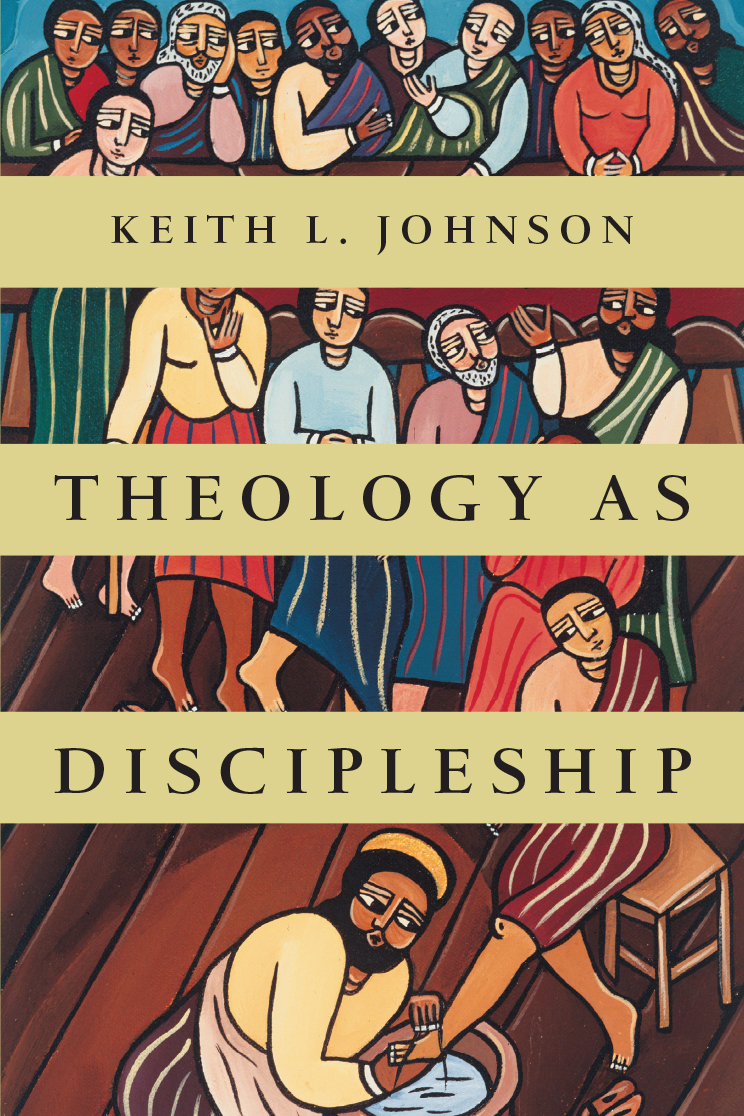
“This is theology that is saturated with Scripture, humbly centered on Christ and the gospel, and earnestly intended for God’s people. This is theology for discipleship, and it is truly theology as discipleship. I learned much from reading it, and I was edified and challenged by it. It is a gift to us all.”
“In Theology as Discipleship, Keith Johnson invites readers to inhabit a rich theological landscape as followers of Christ. Johnson’s book overflows with wisdom and joy as he shows how Christians of all vocations are called to live in union with Christ, being reshaped by God’s Word through the Spirit. This refreshing book is a wonderful theological companion for disciples of Jesus Christ.”
J. Todd Billings, Gordon H. Girod Research Professor of Reformed Theology, Western Theological Seminary, Holland, MI
“Keith Johnson rightly understands that the practices of theology and discipleship are woven together; here he offers wise reflections on how to go about the task under the Word and Spirit and for the sake of the other. He ably points us in the right direction.”
Kelly M. Kapic, author of A Little Book for New Theologians
“Keith Johnson has done a great service not only for the academic study of theology but for the church. In a time when the church’s proclamation of its faith and the academy’s reflection upon faith seem to be deeply divided, Johnson builds a bridge across the chasm. He shows not only why theology is necessary for the church but also why it can only find its true meaning when joined to the church’s life as a form of Christian discipleship. Drawing upon the riches of the church’s past yet grounded solidly in Scripture, this book expounds and reflects upon the gospel as the mystery of God’s will that was foreordained in Christ and does so in a way that is not only deeply learned and careful, but also caring and clear. For those wondering why they should bother with theology at all, they will find here a wise and compassionate answer. For those who turn theology into a practice of intellectual theatrics or point of pride, they will find here an incisive and needed corrective. This book is, in short, a wonderful and exemplary primer to the task of theology that deserves many readers.”
Kimlyn J. Bender, George W. Truett Theological Seminary, Baylor University
“This book is the prescription for all Christians who doubt theology’s relevance for Christian living—and for all Christians who wonder what theology is about and how it works. Keith Johnson has ‘nailed it’ with this fine introductory work on the practical relevance of theology for Christian discipleship. Readers with an appreciation for theology will benefit from reading it as well. The chapters on Scripture express an enlightened evangelical approach to the Bible as the living Word of God.”
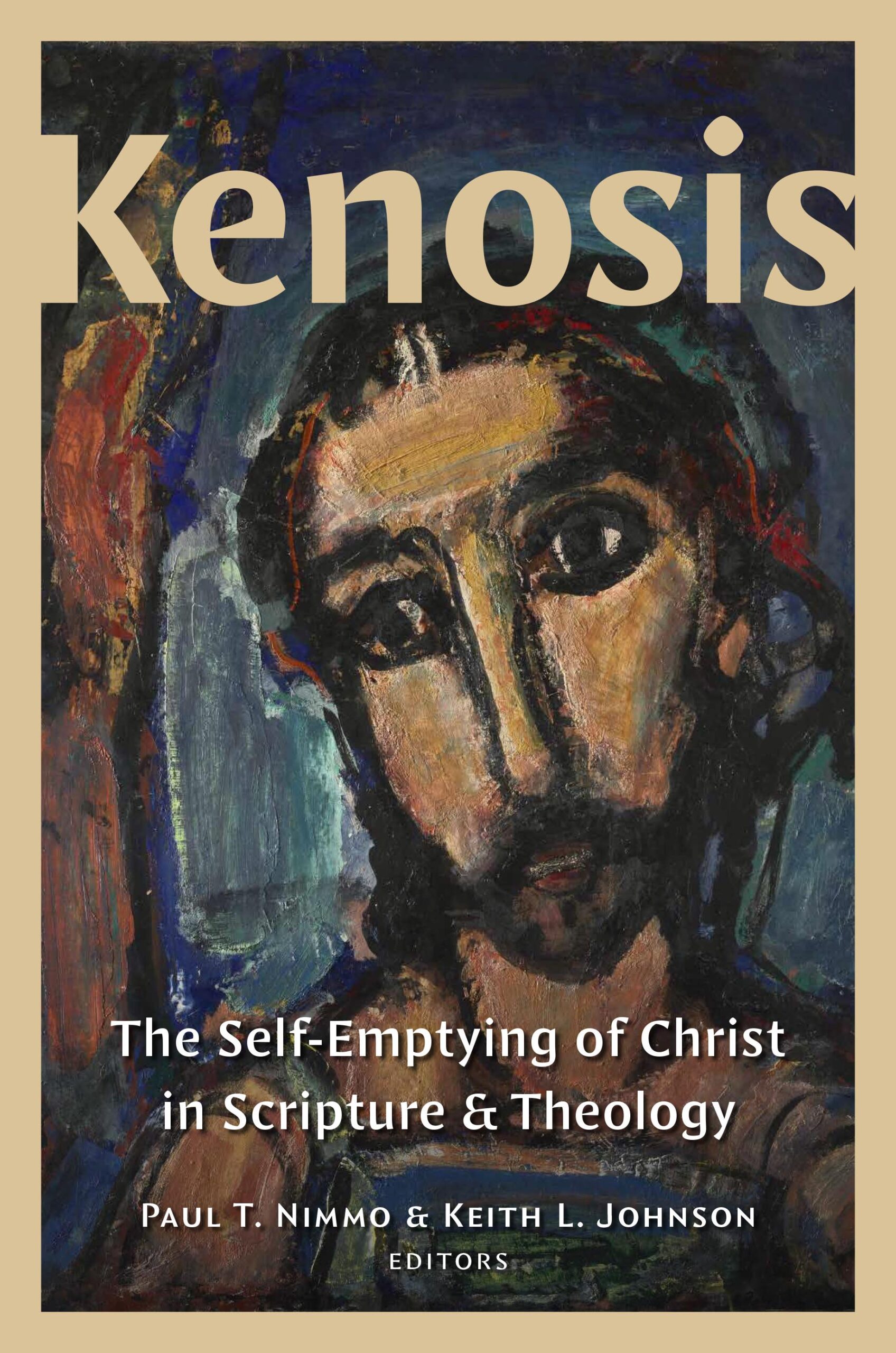
The self-emptying of Christ—theologically explored in the doctrine of kenosis—is a locus within Christology and factors significantly into understandings of the Trinity, anthropology, creation, providence, the church, and even ethics. This volume draws together scholars from across the ecumenical spectrum to expound the biblical roots, historical elaborations, and contemporary implications of the doctrine.
Contributors: John M. G. Barclay, Matthew J. Aragon Bruce, David Fergusson, Beverly Roberts Gaventa, Kevin W. Hector, Keith L. Johnson, Cambria Kaltwasser, Han-luen Kantzer Komline, Grant Macaskill, John A. McGuckin, Paul T. Nimmo, Georg Pfleiderer, Rinse H. Reeling Brouwer, Hanna Reichel, Christoph Schwöbel, Katherine Sonderegger, and Thomas Joseph White.
“This superb collection of new essays on the topic of Christ’s ‘self-emptying’ ranges from reassessments by leading biblical scholars, through exacting historical scholarship on patristic, scholastic, and modern exegetes, to speculative, philosophical, and spiritual renditions for today. It is rare for a collection such as this to evidence such a consistent level of scholarly insight and originality: this is a benchmark volume which will generate yet further discussion on a topic of almost inexhaustible theological interest.”
Sarah Coakley, University of Cambridge
“Philippians 2:5–11, which some have called Paul’s master story, has been—and is—one of the richest sources of Christian theology and spirituality. That wealth is on full display in this delightful (and at times delightfully provocative) interdisciplinary collection of essays on Christ’s self-emptying.”
Michael Gorman, St. Mary’s Seminary and University
“Without question, this is the most helpful and creative collection of essays on kenosis that currently exists in the field. The book covers biblical, historical, and systematic material and draws on a stellar cast of scholars. It is a ‘must’ for any theologian’s bookshelf.”
Tom Greggs, University of Aberdeen
“The mystery of the incarnation witnessed in Scripture and confessed by the church lies at the heart of Christian faith. These outstanding essays examine a facet of this mystery—the humility and self-emptying of Christ in his earthly life. This book is a testament to the gifts of the individual authors and the theological insights of their respective chapters. It offers an exemplary collection examining the mystery of the Son’s journey into the far country of the world.”
Kimlyn Bender, George W. Truett Theological Seminary, Baylor University
“Few topics are more central to Christian theology, perhaps especially in the present day, than kenosis. But what actually is kenosis, what should its function be in the theology of God and Christ, and how might Scripture and the highly diverse Christian tradition instruct us? This book provides a marvelous resource for engaging such questions. The Old and New Testaments, the Greek and Latin Fathers, the scholastics and the Reformers, and a wide swath of the most important theologians of the past century make extended appearances here, illuminated by many of today’s preeminent Christian thinkers. Frankly, this book is a treasure.”
Matthew Levering, Mundelein Seminary
“This exceptional collection of essays engages an issue of abiding importance, offering insights from a range of perspectives: biblical, historical, and systematic. It will repay close study by scholars working in multiple fields, and it forms a benchmark for current and future debates about the place of kenosis in reflection on Christian doctrine, faith, and practice.”
Paul Dafydd Jones, University of Virginia
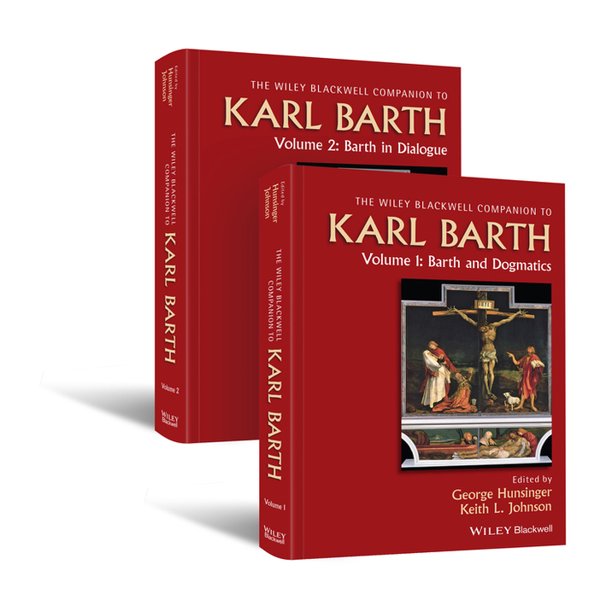
This Companion spans two volumes, comprising 66 chapters written by leading experts in the field. Volume One explores Barth’s dogmatic theology in relation to traditional Christian theology, provides historical timelines of Barth’s life and works, and discusses his significance and influence. Volume Two examines Barth’s relationship to various figures, movements, traditions, religions, and events, while placing his thought in its theological, ecumenical, and historical context.
THE WILEY-BLACKWELL COMPANION TO KARL BARTH
Volume 1: Barth and Dogmatics
I. The Life of Karl Barth
Professional Timeline
Personal Timeline
1. Karl Barth: His Historical and Theological Significance – Christiane Tietz
II. Barth on Doctrinal Topics
2. Barth on the Trinity – Paul D. Molnar
3. Barth on the Filioque – David Guretzki
4. Barth on Divine Election – David Gibson
5. Barth on Revelation – Matthew Bruce
6. Barth on Holy Scripture – Katherine Sonderegger
7. Barth on Theological Method – Kevin Hector
8. Barth on Natural Theology – Keith L. Johnson
9. Barth on Creeds and Confessions – David Lauber
10. Barth on Creation – David Chao
11. Barth on Providence – Sung-Sup Kim
12. Barth on the Incarnation – Robert B. Price
13. Barth on the Atonement – Adam Johnson
14. Barth on Christ’s Resurrection – John Drury
15. Barth on Christ’s Ascension – Andrew Burgess
16. Barth on Theological Anthropology – Jeffrey Skaff
17. Barth on Sin – Matt Jenson
18. Barth on Evil and Nothingness – Wolf Krötke
19. Barth on Death – Cambria Kaltwasser
20. Barth on the Holy Spirit – JinHyok Kim
21. Barth on the Church – Kimlyn Bender
22. Barth on Preaching – William Willimon
23. Barth on Baptism – W. Travis McMaken
24. Barth on the Lord’s Supper – Martha Moore Keish
25. Barth on Justification – Shannon Smythe
26. Barth on Sanctification – Jason Goroncy
27. Barth on Vocation – Paul Nimmo
28. Barth on the Church in Mission – Hannah Reichel
29. Barth on Participation in Christ – Adam Neder
30. Barth on the Christian Life – Marco Hofheinz
31. Barth on the Ethics of Creation – Jonathan Lett
32. Barth on Love – Gerald McKenny
33. Barth on Prayer – Andrew Purves
34. Barth on Religion – Michael Weinrich
Volume 2: Barth in Dialogue
III. Barth and Major Figures
35. Barth and Augustine – Han-luen Kantzer Komline
36. Barth and Anselm – Paul Dafydd Jones
37. Barth and Aquinas – Nicholas M. Healy
38. Barth and Luther – George Hunsinger
39. Barth and Calvin – Randall Zachman
40. Barth and Post-Reformation Theology – Rinse Reeling Brouwer
41. Barth and Edwards – Kyle Strobel
42. Barth and Kant – John Hare
43. Barth and Hegel – Nicholas Adams
44. Barth and Schleiermacher – Ryan Glomsrud
45. Barth and Kierkegaard – David Gouwens
46. Barth and Bonhoeffer – John de Gruchy
47. Barth and Bultmann – Joe Mangina
48. Barth and Tillich – George Hunsinger
49. Barth and Rahner – James J. Buckley
50. Barth and Balthasar – D. Stephen Long
51. Barth and R. Niebuhr – Stanley Hauerwas
52. Barth and Frei – Ben Fulford
53. Barth and T. F. Torrance – David A. S. Fergusson
54. Barth and Jüngel – R. David Nelson
55. Barth and Charlotte von Kirschbaum – Eberhard Busch
56. Barth and Tolkein – George Hunsinger
IV. Barth and Major Themes
57. Barth and Modern Liberal Theology – Gary Dorrien
58. Barth and Biblical Studies – Mark S. Gignilliat
59. Barth and Theological Exegesis – Richard Burnett
60. Barth on Actualistic Ontology – Shao Kai Tseng
61. Barth and Philosophy – Kevin Diller
62. Barth and the Natural Sciences – Andrew Torrance
63. Barth and Interdisciplinary Method – Deborah van Deusen Hunsinger
64. Barth and Practical Theology – Richard R. Osmer
65. Barth and Liberation Theology – Nathan Hieb
66. Barth and Near and Distant Neighbors – Derek Alan Woodard-Lehman
67. Barth and the Ecumenical Movement – Michael Welker
68. Barth and Roman Catholicism – Amy Marga
69. Barth and Eastern Orthodoxy – John Burgess
70. Barth and the Religions – Sven Ensminger
71. Barth and the Jews – Mark Lindsay
72. Barth and Islam – Glenn Chestnutt
73. Barth and Sexual Difference –- Faye Bodley-D’Angelo
74. Barth and Socialism – Andreas Pangritz
75. Barth and War – Matthew Puffer
76. Barth and the Weimar Republic – Rudy Koshar
77. Barth and the Nazi Revolution – Arne Rasmusson

This collection from the 2018 Wheaton Theology Conference features chapters by Marilynne Robinson, Rowan Williams, Lauren Winner, Timothy Larsen, Han-luen Kantzer Komline, Patrica Andujo, Tiffany Kriner, Timothy George, Joel Sheesley, and Keith Johnson,
“Marilynne Robinson’s work is saturated in theology―not only in that it is pervaded by engagement with Christian belief in general but in that it is shaped by years of deep engagement with the texts of the Protestant (especially Calvinist) tradition. We have waited a long time for a collection like this. It is certain to be a rich source of interest and delight.”
Jeremy Begbie, Thomas A. Langford Distinguished Professor of Theology, Duke University
“Marilynne Robinson is perhaps the most vital of living American novelists. This collection contains essay after thoughtful essay exploring various facets of her complex and beautiful body of work. After reading them you feel that you have watched the assembling of a delightful portrait of this most theologically resonant of our writers.”
Alan Jacobs, distinguished professor of humanities, honors program, Baylor University
“The religious themes and insights in Marilynne Robinson’s novels and essays―especially her striking fondness for Calvin―have won her a devoted Christian following. Until now, however, there has been little explicit engagement with her work by theologians. In this volume, an impressive range of thinkers opens up a conversation with the novelist about the Christian life, the Reformed tradition, and the American experience.”
David Heim, executive editor, Christian Century
“If the test of a good story is the kind of person it shapes, then we can only hope that Marilynne Robinson continues to write her stories. Reading her stories makes one want to be more truly alive. They also, as it happens, make one curious to read her nonfiction. In reading both novels and essays, we are introduced to a theologically dynamic vision of the world. This marvelous collection of essays is a welcomed engagement by theologians with an author who demands careful―and repeated!―reading.”
W. David O. Taylor, assistant professor of theology and culture, Fuller Theological Seminary
“Doing theology and reading fiction figure among my best-loved pastimes. Reading theology about fiction ranks almost as high. Yet Balm in Gilead is something better: an interdisciplinary conversation about the theological presuppositions and implications of one of America’s most important living novelists. Entertaining does not come close to doing justice to Marilynne Robinson’s Gilead series, though they are that. Robinson raises profound questions about the shape of Christian ministry and community and, in so doing, exposes and seeks to transform America’s secular social imaginary. In similar fashion, Balm in Gilead raises profound questions about Robinson’s work and theology, putting her in conversation with theologians past (Augustine, John Calvin) and present (Rowan Williams).”
Kevin J. Vanhoozer, research professor of systematic theology, Trinity Evangelical Divinity School
“This collection of thoughtful and erudite essays is a welcome addition to the growing interest in (and admiration of) one of the church’s―and culture’s―preeminent voices of the last thirty years. For readers who are familiar with Robinson’s writing, this collection will provide much-welcomed insight into the theological depth of her essays and novels. For those unfamiliar with her work, this volume provides a lively and accessible theological introduction to one of the major creative thinkers of our time. A must-read for anyone who wants to understand the conversations and currents happening at the deepest levels between the church and culture today.”
Michael Bruner, author of A Subversive Gospel: Flannery O’Connor and the Reimagining of Beauty, Goodness, and Truth
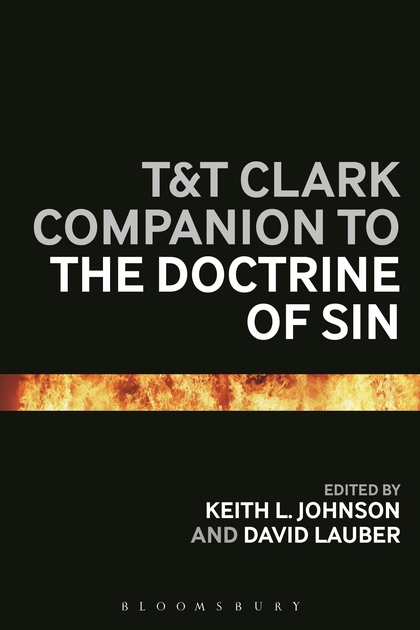
The T&T Clark Companion to the Doctrine of Sin provides a comprehensive treatment of the doctrine of sin. The Companion includes an examination of the biblical and rabbinic accounts of sin, and it provides accounts of sin and its effects offered by key theologians throughout Christian history. It also explores debates surrounding the implications of sin for various doctrines, including God, creation, anthropology, and salvation. The book is comprised of 30 major essays that examine key texts, figures, and debates relevant to the Christian tradition’s discussion of the doctrine of sin.
“This volume of lucid essays presents a comprehensive account of the theology of sin in its biblical, historical, dogmatic and moral dimensions, and makes an original and distinguished contribution to the study of a central element of the Christian faith.”
John Webster, University of St Andrews
“There is wisdom in a multitude of counselors, especially when you are considering something as absurd as sin. Johnson and Lauber have gathered the best of the best – these are the people you want to read on these topics! – and smartly asked them to write long essays on Scripture, major theologians, and perennial issues in the doctrine of sin. The long essay format invites, and delivers, essays that are new, lively, only sometimes in agreement with one another, but always learned, consistently probing and pondering the mystery of iniquity. This isn’t only a companion, it’s a guide.”
Matt Jenson, Torrey Honors Institute, Biola University
“The Companion is admirably clear. This makes it a good reference tool for students of theology and for practicing pastors and ministers, as well as for the generalist member of the public interested in Christian and theological issues.”
Reference Reviews
“These diverse essays comprise an illuminating investigation into that question [what is sin?], searching the biblical roots of the vocabulary of sin, the doctrine’s historical development, and its dogmatic implications … A lucid venture into a difficult topic. This volume will serve as an excellent reference work not only for scholars, but for clergy as well.”
The Expository Times
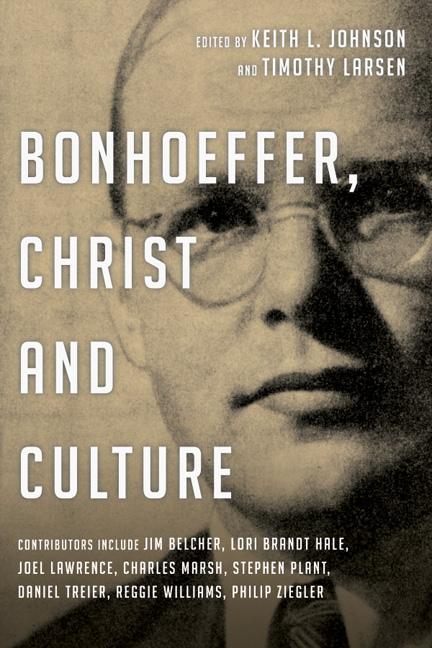
This collection from the 2012 Wheaton Theology Conference features chapters by Philip Ziegler, Timothy Larsen, Reggie Williams, Stephen Plant, Daniel Treier, Joel Lawrence, Charles Marsh, Keith Johnson, Lori Brandt Hale, and Jim Belcher.
“Bonhoeffer, Christ and Culture has its origin within the North American evangelical scholarly community, though not all its authors would identify themselves as such. What unites them is their deep appreciation for Bonhoeffer’s life, witness and theology, the integrity of their scholarship, and their recognition of Bonhoeffer’s continuing significance for the church in the twenty-first century. Having spent the past fifty years of my life engaged in dialogue with Bonhoeffer’s legacy, I am delighted to be introduced to new perspectives and interpretations, and to learn again from those whose contribution to Bonhoeffer studies is now well established. I commend it to all who want to know Bonhoeffer better.”
John W. de Gruchy, University of Cape Town
“It is challenging to bring a historical figure into discussion of current concerns, but the scholars in this volume are generally effective in indicating the continued relevance of Bonhoeffer’s thought and ministry. Recommended for scholars and serious general readers with an interest in Bonhoeffer’s life and thought.”
John Jaeger, Library Journal
“By including studies on higher education, technology, vocational realities of today, spiritual disciplines, and the pattern of congregational life, the volume brings Bonhoeffer’s theological questions into conversation with contemporary issues throughout the church and academy. Ten contributors open a new window into evangelical interpretations of his theology, giving a sense of how Bonhoeffer himself struggled as well as where the future of Bonhoeffer studies may be headed.”
Interpretation: A Journal of Bible and Theology, 2014, Vol 68(1)
“This volume provides an insightful treatment of multiple dimensions of work of Dietrich Bonhoeffer and it is a testimony to the ongoing viability of his legacy in the context of American Christianity.”
Logia, Epiphany 2014